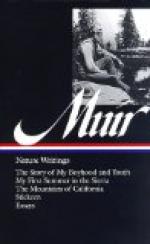Breakfast in those auld-lang-syne days was simple oatmeal porridge, usually with a little milk or treacle, served in wooden dishes called “luggies,” formed of staves hooped together like miniature tubs about four or five inches in diameter. One of the staves, the lug or ear, a few inches longer than the others, served as a handle, while the number of luggies ranged in a row on a dresser indicated the size of the family. We never dreamed of anything to come after the porridge, or of asking for more. Our portions were consumed in about a couple of minutes; then off to school. At noon we came racing home ravenously hungry. The midday meal, called dinner, was usually vegetable broth, a small piece of boiled mutton, and barley-meal scone. None of us liked the barley scone bread, therefore we got all we wanted of it, and in desperation had to eat it, for we were always hungry, about as hungry after as before meals. The evening meal was called “tea” and was served on our return from school. It consisted, as far as we children were concerned, of half a slice of white bread without butter, barley scone, and warm water with a little milk and sugar in it, a beverage called “content,” which warmed but neither cheered nor inebriated. Immediately after tea we ran across the street with our books to Grandfather Gilrye, who took pleasure in seeing us and hearing us recite our next day’s lessons. Then back home to supper, usually a boiled potato and piece of barley scone. Then family worship, and to bed.
Our amusements on Saturday afternoons and vacations depended mostly on getting away from home into the country, especially in the spring when the birds were calling loudest. Father sternly forbade David and me from playing truant in the fields with plundering wanderers like ourselves, fearing we might go on from bad to worse, get hurt in climbing over walls, caught by gamekeepers, or lost by falling over a cliff into the sea. “Play as much as you like in the back yard and garden,” he said, “and mind what you’ll get when you forget and disobey.” Thus he warned us with an awfully stern countenance, looking very hard-hearted, while naturally his heart was far from hard, though he devoutly believed in eternal punishment for bad boys both here and hereafter. Nevertheless, like devout martyrs of wildness, we stole away to the seashore or the green, sunny fields with almost religious regularity, taking advantage of opportunities when father was very busy, to join our companions, oftenest to hear the birds sing and hunt their nests, glorying in the number we had discovered and called our own. A sample of our nest chatter was something like this: Willie Chisholm would proudly exclaim—“I ken (know) seventeen nests, and you, Johnnie, ken only fifteen.”
“But I wouldna gie my fifteen for your seventeen, for five of mine are larks and mavises. You ken only three o’ the best singers.”
“Yes, Johnnie, but I ken six goldies and you ken only one. Maist of yours are only sparrows and linties and robin-redbreasts.”




